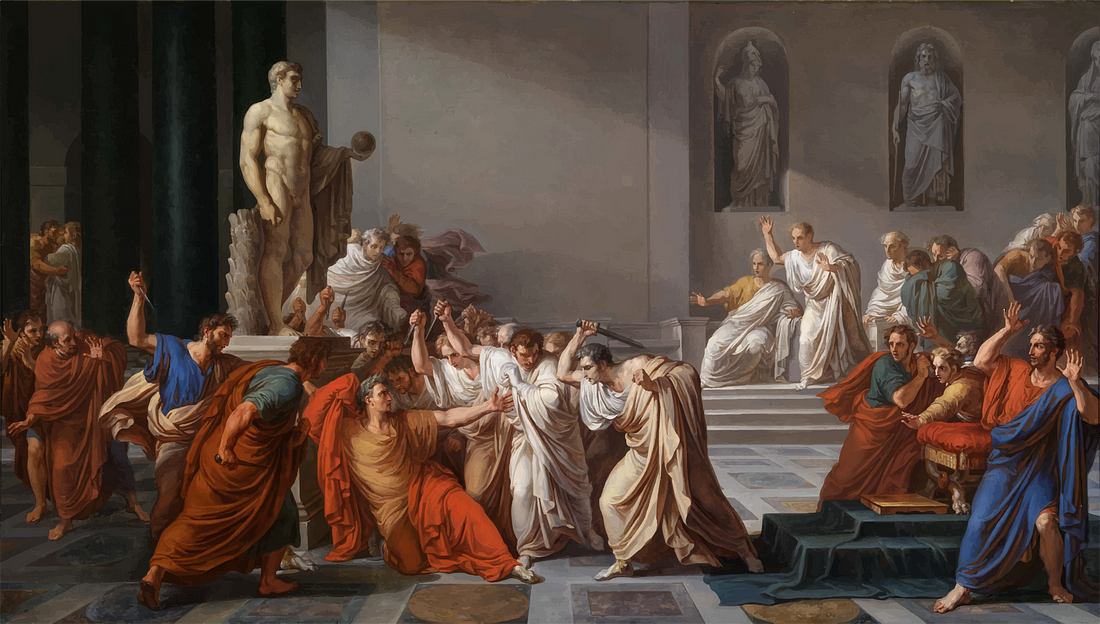William Shakespeare’s JULIUS CAESAR
“Caesar: Who is it in the press that calls on me? I hear a tongue shriller than all the music
Cry "Caesar!" Speak, Caesar is turn'd to hear.
Soothsayer: Beware the ides of March.
Caesar: What man is that?
Brutus: A soothsayer bids you beware the ides of March.”
Characters in William Shakespeare’s Julius Caesar, Act I, Scene 2
“Beware the ides of March,” a soothsayer tells Julius Caesar, the emperor and perpetual dictator of Rome. He was too carried away by grandiose delusions of his own power to discern that the fortune teller’s words might be true. His bloody assassination in 44 BC forever marked March 15 as a date of notoriety. In response, every year on this evening, I have a dinner in his honor. Not that I particularly put Caesar on a heroic pedestal, but he is an intriguing character.
Vincenzo Camuccini was an Italian painter of Neoclassic histories and religious paintings. He was considered the premier academic painter of his time in Rome.
Caesar tried twice to invade England in 55 and 54 BC. At the time, Britain was in the midst of Iron Age culture. Though the Romans made no conquests in Britain those two years, Caesar enthroned Mandubracius, a friend of Rome, who helped bring the island into the political influence of Rome. Historian Tacitus remarked that Caesar “revealed, rather than bequeathed, Britain to Rome.”
Ten years later, a group of Roman statesmen deemed Caesar a tyrant and, calling themselves “the liberators,” quickly plotted his murder. Tragically — and maybe this is what grips me concerning the political homicide — even his friend Brutus got involved in the conspiracy.
There is really no historical evidence of Julius Caesar uttering Shakespeare’s famous “Et tu, Brute?” or “And you, too, Brutus?” But, he had to be surprised and pained by the unexpected duplicity of his friend. That double-dealing may have hurt him more than the 23 stab wounds given by the daggers of the Roman Senators. Some critics have contended that perhaps he uttered the words as a curse, meaning something like, “Just wait, your time will come next.” Brutus committed suicide two years later after being defeated in a battle with Mark Antony.
Brutus is near the top any list of the biggest traitors of all time, with Benedict Arnold, Tokyo Rose, Julius and Ethel Rosenberg, Guy Fawkes, and, needless to say, Judas Iscariot. I have been betrayed and I know what it is like to have a partner, a priest, a friend, and a trusted associate violate my faith or confidence, the turmoil it put me in, the hurt, the agony. I wish I had encountered a soothsayer on the way to at least one of these chicaneries — but would I have listened?
A quick response to infidelity is to want revenge or to proffer pseudo forgiveness. I learned a better reaction is to take a little time, acknowledge the breach in the relationship, grieve it but not too long or too deeply, talk the matter over with someone wise, and resist being obsessed with the past.
During his murder, Julius Caesar had little time to realize being literally stabbed in the back, and no time to recover. And so, for all those who have been betrayed, take this day to honor one of the towering treacheries of all time. I’ll cook my Roman recipes of Chicken Fronto and honey-fried stuffed dates and give my own toast, “Hail, Caesar! I have no regrets about my past, for even the betrayals encountered brought me to this now!”

